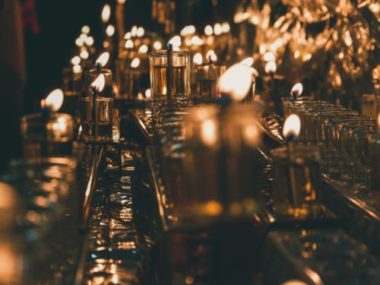Sharing in the Joy of Hanukkah
Note! There are alternative spellings for the name of this festival. Hanukah, Chanukah, or Chanukkah, and any of these may be without the final “h”.
This year, Hanukkah starts on Sunday evening, December 14, 20’25 (at sundown). It continues through Monday, December 22, 20’25 (until sundown).
(On the Friday afternoon of Hanukkah, Jews should be careful to finish lighting the Hanukkah lights, and then light their Shabbat candles before sundown. In this way, they will avoid transgressing their Sabbath restrictions.)

SUGGESTIONS FOR NOAHIDES ON HANUKKAH
As a Gentile, you can mark the happy days of Hanukkah in some of these customary ways. This includes the option to say the chapters of Psalms listed below, reading and thinking about the history and messages of Hanukkah, and enjoying some traditional recipes. You can also attend public lightings of outdoor Hanukkah menorahs that might be taking place near you during the festival. Contact your local Chabad organization for more information about times and places.
- Some have a custom to say any or all of the following chapters of Psalms on each day of Hanukkah. They are related to the message and spirit of Hanukkah: Psalms 30, 33, 67, 91, 133.
- It’s a special time to give charity during Hanukkah, to proper charitable institutions or causes, or to needy individuals. And try to do more deeds of goodness and kindness for others! It’s also good to have a charity box or can (a “pushka“) in your home, that you can drop coins into frequently and then give them (or the accumulated amount) to a proper charity when it is filled up.
- Parents can give small gifts of money (Hanukkah “gelt”) to their children on some or all of the days, to teach them to put part of their money (for example 10%) into a charity box at home, to be given later to a proper charity.
(Note: we recommend not to give gifts specifically as “Hanukkah presents” since this recent development distorts the true message of Hanukkah. Rather, you can give gifts just as at any other time.)
Traditional foods during Hanukkah
It’s customary during Hanukkah to eat some traditional foods fried in oil. This is to remember the miracle of the small jug of pure oil – only enough for one day – that was miraculously found and which then burned in the Temple’s menorah for 8 days after the Greek army retreated from Jerusalem.
It’s also customary to have some dairy foods and drinks, to remember the military victory of the Maccabee priests (Kohanim, descended from Aaron) over the Greeks. This is because Jerusalem was retaken by the Maccabee brothers through of the heroic act of Yehudis, their righteous sister. (She came to the Greek general and fed him a feast of cheese and wine. When he fell asleep, she dealt to him the end he deserved, and the leaderless Greek army panicked and retreated.)
Click here for a delicious traditional recipe: Hanukkah “Latkes” (fried potato pancakes)
⇒ Did you know? “Maccabee” is the Hebrew acronym “Mem-Chof-Bais-Yud”, which stands for the verse (Exodus 15:11) “Who is like You among the Elim (the supernal beings), O L-rd!” A Chassidic discourse published by Kehot explains the inner meaning of this verse, on the subject of G-d’s True Existence.
Links to more Hanukkah insights
Guidelines for Noahides about lighting Hanukkah candles
Lesson from Hanukkah to Publicize the 7 Laws
The “Jewish Experience” radio/audio series on the history of Hanukkah: Hanukkah, Parts 1-4
Expanded-edition video of the Rebbe’s talk on Thanksgiving and Hanukkah
A Miraculous Story for the Fifth Night of Hanukkah
Video lesson: The Kabbalistic Spin on the Hanukkah Dreidel
The Heroine of Hanukkah – Yehudit (or Yehudis)
A Noahide’s Perspective on Lessons from Hanukkah
One-minute lessons about Hanukkah from Rabbi Nachman Simon
PLEASE NOTE: The Noahide prohibition against theft is very strict. If you are using the Internet at work, please take care to not make personal photocopies and/or printings on expropriated company-owned paper.








